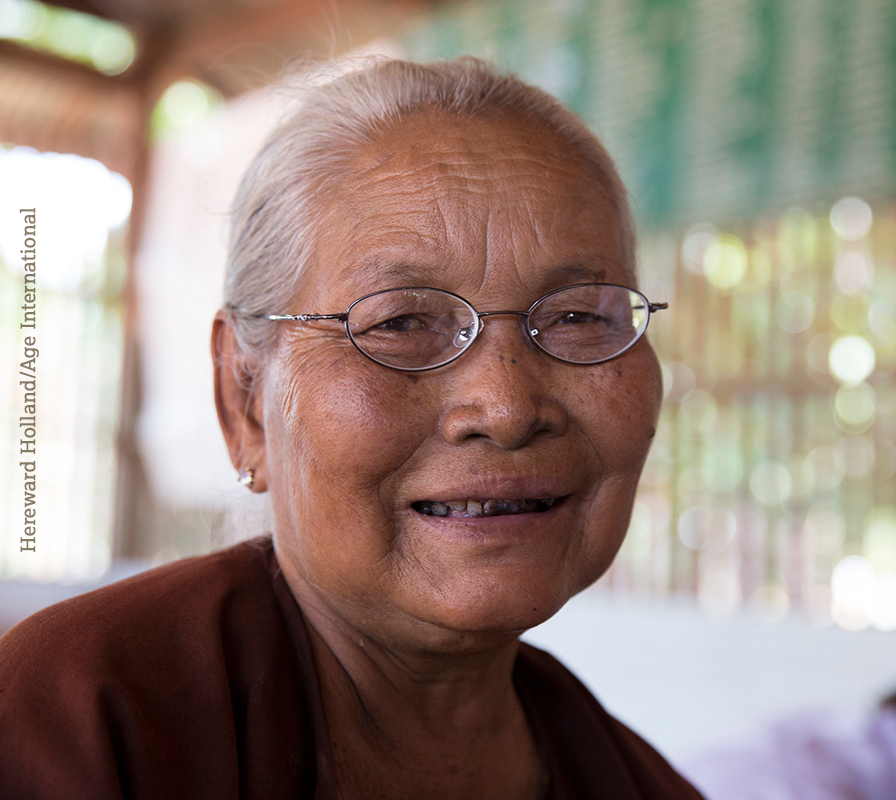While humanitarian organisations are increasingly recognising the exclusion of people due to their age, disability or gender (or combination of characteristics) in policies and guidelines, there are still significant gaps in operationalising this at the field level. The needs and capacities of older women and men and people with disabilities are often under-represented in a humanitarian crisis. Older women and older women with disabilities face multiple forms of discrimination, adding to their risk of violence, abuse, and exploitation. Older people and people who face multiple discriminations are most frequently those who are most in need and whose voices are not heard, whose capabilities not recognized, and who have little opportunity to participate in and lead decision-making.
Populations are ageing most rapidly in developing countries, which are currently home to 60 per cent of the world’s older people, projected to rise to 80 per cent by 2050. While the ageing population is to be celebrated, an ageing population has the potential to increase older people’s vulnerability to risks and disasters, especially in low- and middle-income countries. Prevalence of disability in lower-income countries among people aged 60 years and above is 43%, compared with 30% in higher-income countries (WHO 2011). All too often, disasters (whether slow or rapid onset) result in an avoidable and disproportionate loss of life and impoverishment among older people, including older people with disability whose vulnerabilities and capacities are overlooked, even though they have the same rights as other age groups to protection from physical and psychological harm.
HelpAge International, along with many like-minded organisations, is working towards ensuring inclusion in disaster risk reduction (DRR) and humanitarian work. There are Humanitarian Inclusion Standards, which provide tools and processes to help in inclusion. However, limited understanding and lack of tools has hindered progress to inclusion. Research has shown that appropriate amount of resources, on both risk reduction planning and inclusive humanitarian response by governments and other humanitarian actors, have not been invested. Older people, including older people with disability, are considered solely as vulnerable, and their capacities are not utilised. This exacerbates their vulnerability.
To better help the HelpAge network and other like-minded organisations on inclusion in DRR and humanitarian response, HelpAge has developed many awareness materials and publications demonstrating examples of inclusion. It has done a lot of research also on the subject, which helps in influencing stakeholders on the need for inclusion.
Responding to the need at ground level, we has produced a collection of games on inclusion of age, disability and gender in DRR and humanitarian response for field staff of HelpAge and other like-minded organisations. These games are easy to play and don’t require a lot of resources. We hope this versatile and participatory games will encourage active learning and engagement, simplify complex issues into practical realities, and in the end ensure that older people are part of DRR initiatives at the community and local level, both as a participant and beneficiary.
Games on inclusion of age, disability and gender
There are 28 games categorised into 5 themes: Awareness, Tools and Resources, Mapping, Promotion of meaningful participation, access and dignity, and Needs assessment and data management.
Each game includes a detailed instruction sheet for facilitators and all resources for the game. Games use a variety of techniques including card games, decision gates, group brainstorming, and role-play to achieve their respective learning objectives. An overarching ‘Facilitation tips’ document is available to provide some general advice to facilitators on learning through games.
Click on each theme to see relevant games or click the whole collection to download all games at once.
Download facilitation tips
- Attitudinal, environmental and institutional barriers
- Inclusion in Livelihoods
- Recognising disability in older people
- Rights-based model to programming
- Unconscious Bias
- Why inclusion matters
- Buddy system for pre-, during and post-disaster
- How to use the HIS key standards
- How to use the HIS sector standards
- Humanitarian inclusion standards by sector
- Identifying support needed for evacuation
- Inclusion in an evacuation plan
- Inclusion in DRR committees
- Individual preparedness plans
- Using the protection inclusion standards
- Identifying vulnerabilities and capacities
- Mapping organisations and capacities
- Mapping vulnerabilities and capacities of older people
- Recognising capacities of older people in disaster risk management
- Building resilience with assistive products for older people including older people with disabilities
- Creating accessible meetings
- Designing inclusive water, sanitation and hygiene (WASH) facilities
- Meaningful participation in decision-making
- What is dignity?
- How SADDD informs programmes
- Inclusive data collection
- Need for inclusive data
Download all games and facilitation tips (Zip)

